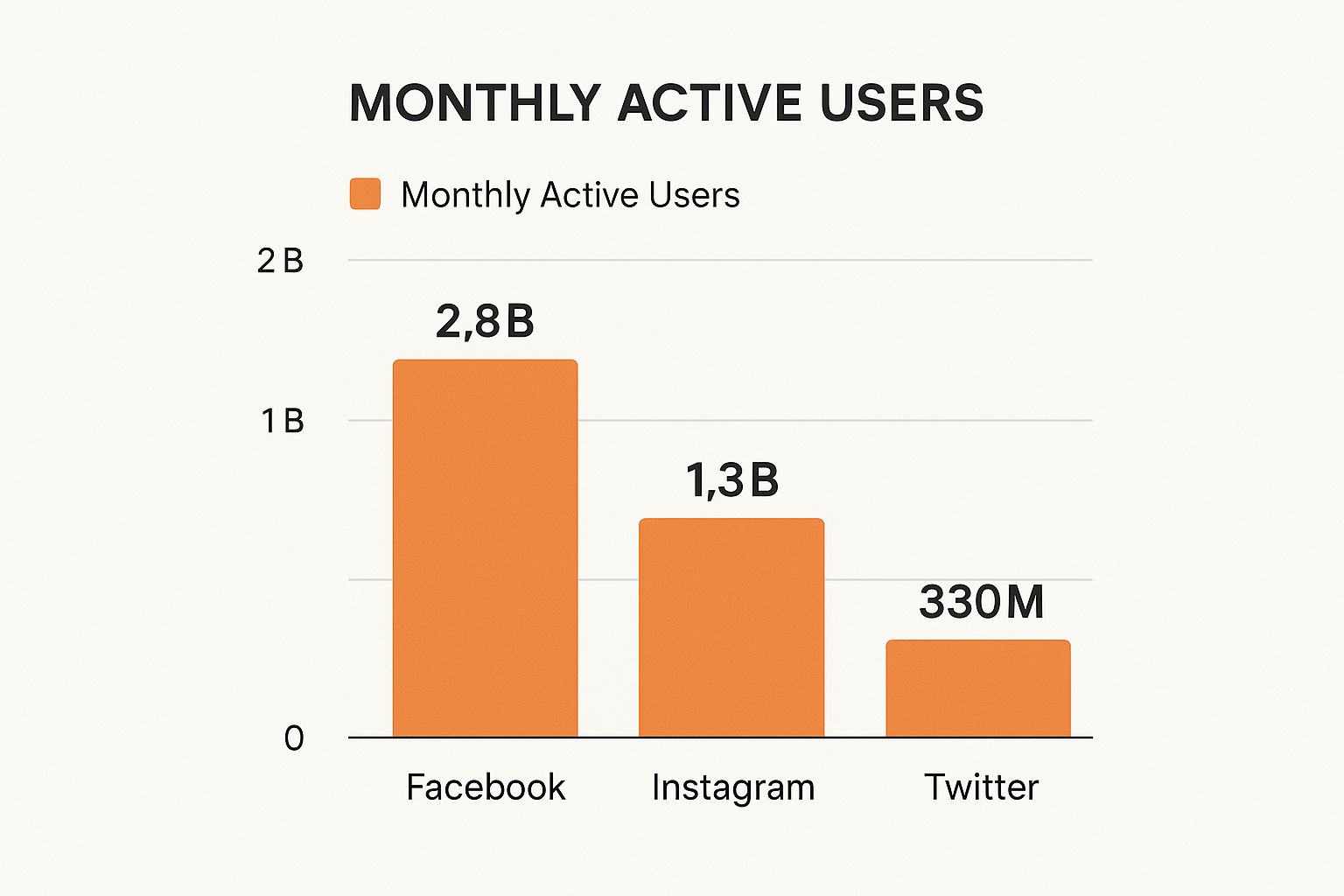Social media market research is all about gathering intel from platforms like Reddit, Twitter, and Facebook to get a real-time pulse on your audience, brand, and industry. For solo founders and indie hackers, it's less about abstract data and more about finding a validated business idea by listening to what people are actually saying online.
The New Playbook for Social Media Market Research

Let's be honest, traditional market research is broken for modern builders. Focus groups and pricey surveys are just too slow and expensive, and they often fail to capture the raw, unfiltered voice of potential customers.
The modern approach to social media market research completely flips that script. It’s not about passively listening from the sidelines; it’s an active strategy for building a business from the ground up, starting with real problems. This shift gives indie hackers and solopreneurs a massive advantage. You can stop guessing what people want and start tapping directly into communities where they're already talking about their pain points.
Uncovering Real Problems on Reddit
Think of platforms like Reddit. They're absolute goldmines for startup ideas, especially for indie hackers and solopreneurs. You've got countless niche communities where people openly vent about their frustrations, ask for solutions, and describe their unmet needs in painstaking detail. These aren't manufactured problems. They are raw, genuine pain points that people are desperate to solve.
The catch? Manually sifting through thousands of posts to find those gems is a huge time-sink. That's where specialized tools come in to speed things up dramatically.
For founders, the goal isn't just to find an idea; it's to find a problem that people are actively seeking a solution for. Communities on Reddit offer a direct window into these needs, providing both the problem and the potential first customers.
From Idea to Validation with Targeted Tools
While a lot of social listening tools focus on broad brand mentions or general trends, a new wave of solutions is built specifically to help founders pinpoint actionable problems. A great example of this is ProblemSifter. It’s designed to do one thing really well: analyze subreddits to find posts where users are explicitly stating a real user pain point. It turns all that community chatter into a concrete list of potential startup ideas.
Unlike other tools, ProblemSifter doesn’t just suggest ideas—it connects you to the exact Reddit users asking for them. You get the original post and the usernames of the people who expressed the need, giving you a direct line for validating your startup idea with community data and for targeted outreach. This approach completely changes the game.
- Ideate with confidence: You're basing your startup on a real, documented problem someone has.
- Validate quickly: You can reach out directly to the people who are already feeling the pain.
- Promote effectively: Your first users are the very people who asked for a solution like yours in the first place.
For builders trying to get an edge, this method is far more effective than casting a wide net with traditional research. The pricing is simple and competitive, designed for founders. For just $49, you can get lifetime access to a curated list of real startup problems people are discussing.
Defining Your Research Goals and Scope
Jumping into social media without a clear plan is like sailing without a map—you’ll drift aimlessly and likely end up nowhere useful. Any solid social media market research starts with setting sharp, actionable objectives. A fuzzy goal like "understand the market" is a surefire way to get buried in data and waste precious time.
You need a focused mission. The whole point is to come up with specific, answerable questions that will act as your North Star through the entire process. Think less about capturing broad trends and more about zeroing in on tangible problems you can actually solve.
From Vague Ideas to Actionable Questions
Specificity is your secret weapon here. It’s what turns a generic research project into a targeted investigation, giving you insights that can directly shape your product, marketing, and how you talk to customers.
Let's look at how to reframe those broad goals into questions that really get you somewhere:
Instead of: "I want to see what designers are talking about."
Try asking: "What are the top three software frustrations for freelance designers when they're dealing with client feedback?"
Instead of: "Let's find out about our competitors."
Drill down to: "Which missing features do users of Competitor X's software complain about most on Reddit and Twitter?"
Getting this granular ensures you're not just collecting random data but actively hunting for real opportunities. You’re on the lookout for the gaps, the pain points, and the unmet needs that are the bedrock of any successful product.
Choosing Your Battleground Wisely
Don't make the mistake of thinking all social platforms are the same. They aren't. Your choice of where to listen should align directly with the questions you're trying to answer. Every community has its own culture, lingo, and purpose.
Here’s a quick rundown from my own experience:
- Reddit: This is an absolute goldmine for niche technical problems and brutally honest user complaints. Subreddits like
r/saasorr/solopreneurare packed with people openly discussing their business challenges. It is a fantastic source of insight for indie hackers and solopreneurs. - Twitter (X): Fantastic for tracking industry chatter in real-time, keeping an eye on competitor announcements, and getting a feel for the broader conversation in a professional community.
- Facebook Groups: Perfect for observing specific hobbyist or local communities. This is where you’ll get insights into consumer behavior and lifestyle-related problems.
- LinkedIn: The go-to for B2B research. If you need to understand professional pain points or analyze corporate-level industry talk, this is your place.
The key is to go where your target audience already lives and speaks candidly. You're searching for the digital town square where people gather to share their real-world struggles. That’s where you’ll find the most valuable, authentic insights.
Defining a clear scope is the best way to prevent "analysis paralysis." By focusing on one or two key platforms and a handful of specific questions, you can gather deep, meaningful data instead of just skimming shallow, widespread noise.
Setting Metrics for Success
So, how do you know if your research is actually working? You need to establish clear metrics before you even start. And no, I'm not talking about vanity metrics like follower counts; I mean quantifying the insights you pull in.
Your success metrics could look something like this:
- Identifying 10-15 unique, recurring pain points mentioned by at least five different users.
- Finding 3-5 explicit requests for a solution that doesn't currently exist.
- Compiling a list of 20+ potential early adopters who have openly expressed frustration with current tools.
With roughly 5.45 billion social media users out there, the sheer volume of conversation is staggering. And get this: 25.9% of these users are actively using social platforms to research products, making these channels crucial for consumer decision-making. By setting clear goals, you can cut right through the noise and tap into this behavior. If you want to dig deeper into how user behavior is shifting, check out these game-changing social media statistics.
This structured approach transforms social media from a simple content channel into a powerful engine for ideation and validation. It ensures every hour you spend on research actually pushes your startup idea forward.
How to Find and Validate Problems in Niche Communities

Alright, you've got your research goals. Now for the fun part: digging into the online communities where your future customers are already talking about their problems. As a founder, your goal isn't just to spot broad trends. It's to embed yourself in the right niche and find the real, nagging pain points people face every day.
Think of platforms like Reddit less as social media and more as a massive, searchable archive of human frustration. This is where you graduate from theory and start listening to the raw, unfiltered language people use to describe their struggles. Before you can solve anything, you have to become a genuine observer.
Mastering the Art of Community Observation
Every online community, especially on Reddit, has its own culture—its own slang, inside jokes, and unwritten rules. If you just jump in with a survey or a pitch, you'll be tuned out instantly. Your first job is to just listen.
Start by identifying the subreddits where your ideal customers hang out. If you're building for fellow entrepreneurs, you might lurk in communities like r/solopreneur, r/saas, or r/growmybusiness. Spend a few days just reading. Check out the top posts of all time, the most active threads from the last month, and the daily Q&A discussions.
You're listening for the specific vocabulary people use. Are they constantly complaining about a certain tool's annoying limitations? A clunky workflow they can't seem to fix? These recurring complaints are the breadcrumbs that lead to a real business idea.
Identifying Patterns of Frustration
Manually sifting through hundreds of posts is a grind, but it’s the best way to build intuition. As you read, keep an eye out for phrases that signal a real, unsolved problem. These are gold.
- "Does anyone know a tool that...?"
- "I'm so tired of dealing with..."
- "Why hasn't someone built a solution for...?"
- "My biggest frustration with [Competitor X] is..."
A single complaint can be an outlier. But when you see the same problem pop up again and again, mentioned by different people in different ways, you’ve hit on a genuine market gap. That's the core of problem-led entrepreneurship.
To keep track of everything, a simple spreadsheet works wonders. Log the subreddit, the specific problem, a link to the post, and the username. It's a manual process, for sure, but it builds an incredibly deep understanding of the market. Of course, for those who want to move faster, there are better ways. If you want to go deeper on this discovery process, our guide on how to find problems to solve is a great next step.
Accelerating Problem Discovery with Specialized Tools
While manual research is fantastic for building empathy, it just doesn't scale. This is where specialized tools can be a game-changer, especially for indie hackers. If you're focused on finding real user pain points on Reddit, a tool like ProblemSifter was built for exactly this.
Instead of you spending days scrolling, ProblemSifter automates the grunt work. It scans entire subreddits and uses intelligent analysis to surface the exact posts and comments where people are describing their problems and unmet needs. It cuts through the noise and hands you a list of real startup ideas.
Here’s why it works so well for startup ideation:
- It connects ideas to actual people. ProblemSifter doesn't just give you a generic idea; it links you to the specific Reddit users who are asking for a solution. You get the original post and the usernames of people feeling the pain.
- It enables immediate outreach. This is a founder's superpower. You instantly have a list of potential first customers who have already told you what they want. You can reach out for feedback, recruit beta testers, and start building an audience before writing a single line of code.
- It’s designed for builders. The pricing is straightforward. For just $49, you get lifetime access to a curated feed of problems from one subreddit. Need to go broader? $99 gets you lifetime access to three subreddits. No subscriptions, no recurring fees.
This approach lets you skip the guesswork and focus on building something you know people already want.
Validating Your Idea with Community Data
Once you’ve found a promising problem—whether manually or with a tool—you need to validate it. Is the pain sharp enough that people would actually pay to make it go away? Using the usernames and posts you've collected, you can start finding out.
The key is to engage respectfully. Don't slide into DMs with a sales pitch. Instead, reply to the original threads. Ask clarifying questions. Show that you genuinely understand their frustration. This builds trust and makes you a member of the community, not just another marketer trying to sell something.
This turns market research from a passive listening exercise into an active cycle of discovery, validation, and community building. You're not just finding an idea; you're finding your first ten customers and building the solution right alongside them.
Choosing the Right Tools for Social Data Analysis
You’ve spotted a potential problem—that’s a huge first step. But to really know if it’s worth building a business around, you need to understand the scale and specifics of the conversation. This is where your toolkit for social media market research comes into play.
The market is flooded with options, and it’s easy to get overwhelmed. You’ve got everything from simple spreadsheets for manual tracking all the way up to complex, enterprise-level social listening platforms that feel like using a sledgehammer to crack a nut for an indie hacker.
The secret is matching the tool to the task at hand. If you’re a massive brand tracking sentiment across millions of mentions, a comprehensive suite makes sense. But for solopreneurs and early-stage makers, the goal is far more fundamental: finding a real, unsolved problem you can build a solution for.
This chart really puts the scale of these platforms into perspective, showing you where the biggest pools of potential customers are hanging out.

With user bases this massive, you can see why specialized tools are so critical. Without them, you're just trying to drink from a firehose, searching for a signal in a sea of noise.
Tools for Different Stages of Research
Your toolkit should evolve with your project. In the beginning, you need efficiency and direct access to user pain points, not a mountain of analytics dashboards to climb.
Here’s a practical breakdown:
- Manual Spreadsheets: The classic starting point. A simple Google Sheet or Notion database is perfect for logging problems, linking to posts, and noting usernames. It’s free, and more importantly, it forces you to slow down and really understand the context behind each problem you find.
- Broad Social Listening Suites: Tools like Brandwatch or Sprout Social are incredibly powerful for tracking brand health, analyzing competitor "share of voice," and spotting macro trends. The catch? Their steep monthly subscriptions and complex features are often way more than a founder needs during the lean, problem-discovery phase.
- Niche Problem-Discovery Tools: This is a newer, exciting category of tools built specifically for makers like us. They are designed to find the needle in the haystack—those specific, actionable user frustrations that can become the foundation of a great product.
The best tool for a founder isn't the one with the most bells and whistles. It's the one that gets you closest to your future customers' problems with the least amount of friction and cost.
Why ProblemSifter is a Go-To for Indie Hackers
This is where a tool like ProblemSifter really shines, especially for indie hackers and solopreneurs deep in the ideation and validation trenches.
While other tools give you broad analytics, ProblemSifter is hyper-focused on one thing: uncovering real, unfiltered problems on Reddit that people are actively trying to solve. Its unique approach is built around delivering exactly what a founder needs to get started.
It doesn't just spit out vague ideas. Unlike other tools, ProblemSifter doesn’t just suggest ideas—it connects you to the exact Reddit users asking for them. This is a total game-changer. You get the "what" (the problem), the "who" (your potential first customer), and the "where" (the original post). This lets you not only build something people want but also promote it with targeted, warm outreach right from day one.
For a wider look at the landscape, you can check out our deep dive into the best market research tools for a broader comparison.
Comparison of Social Media Research Tools for Founders
To make the choice clearer, I’ve put together a simple table comparing the options from a founder's perspective. It highlights the primary use case and pricing model, which are usually the two most important factors when you're just starting out.
| Tool | Primary Use Case | Pricing Model | Best For |
|---|---|---|---|
| ProblemSifter | Finding validated startup problems on Reddit | Lifetime access: $49 for 1 subreddit, $99 for 3 | Indie hackers & solopreneurs |
| Brandwatch | Enterprise social listening & trend analysis | Monthly Subscription ($$$$) | Large marketing teams |
| Sprout Social | Social media management & analytics | Monthly Subscription ($$$) | Businesses managing multiple accounts |
| Manual Spreadsheet | Basic problem tracking | Free | Founders starting with zero budget |
The key takeaway here is the alignment between the tool and your immediate goal. For early-stage problem discovery, a targeted, cost-effective tool often delivers far more value than a pricey, all-in-one suite.
A Cost-Effective Alternative to Subscriptions
The business model is another huge differentiator. So many analytics tools lock you into expensive, recurring subscriptions that can bleed a pre-revenue project dry.
ProblemSifter flips that model on its head. It’s a simple, one-time payment built for builders on a budget. For just $49, you get lifetime access to a curated list of real startup problems from one subreddit. For $99, you get access to three. No subscriptions, no hidden fees. It’s an incredibly accessible investment in finding a validated business idea.
This direct line to users, combined with a founder-friendly price, makes it a powerful ally in your social media market research efforts. With the global social media market projected to hit a valuation of $466.56 billion by 2025, the ability to cut through the noise with targeted, efficient tools has never been more valuable.
Turning Social Insights into Actionable Outreach
Finding a problem people are desperate to solve is a huge win, but it’s really just the starting line. The real work begins when you translate that raw insight from your social media market research into a concrete go-to-market plan. This is the moment you bridge the gap between research and revenue, turning online chatter into your first real customer conversations.
It all starts with boiling down your findings into a crystal-clear problem statement. What’s the core frustration people are venting about? Try to frame it using their exact words, the language you saw them use in forums and comments. Once you have that, you can start crafting a value proposition that actually resonates because it speaks directly to their pain.
https://www.youtube.com/embed/YJ-YX_AcomU
The Power of Warm Outreach
Here’s where a tool like ProblemSifter gives founders an almost unfair advantage. We all know what traditional outreach feels like: it’s cold, impersonal, and usually gets ignored. But what if you already knew who was struggling with the exact problem you solve?
Your entire approach flips on its head. Instead of blasting out cold messages, you’re starting warm, relevant conversations. You literally have a list of Reddit usernames who have, in their own way, raised their hands and asked for help. This opens the door for a targeted and respectful way to engage that builds a genuine connection from the very first message.
ProblemSifter is different because it provides not just the idea, but the original post and the Reddit usernames expressing the pain point. Your outreach shifts from a shot in the dark to a direct, meaningful conversation with someone who's already looking for a solution.
You’re not interrupting someone’s day; you’re joining a conversation they already started. By referencing their original post, you instantly show that you've been listening and you understand their specific issue. That simple act alone will dramatically increase your chances of getting a positive reply.
Practical Steps for Engaging on Reddit
Let's be clear: engaging with potential customers on a platform like Reddit requires a bit of finesse. You can't just storm in with a sales pitch. The goal is to collect deeper feedback and build a tribe, not to push your product.
Here are a few practices that have always worked for me:
- Lead with Empathy, Not a Pitch: Start your message by acknowledging their frustration. Something as simple as, "I saw your post about dealing with [problem], and it really hit home for me," can make all the difference. Show you get it before you ask for anything.
- Ask Open-Ended Questions: Your goal is to get them talking. Ask things like, "What have you tried so far to fix this?" or "If you could wave a magic wand, what would the perfect solution do for you?" The answers are gold for your product roadmap.
- Offer Value First: Before you even think about asking them to try your product, offer something helpful. Maybe you know a workaround or can point them to a useful article. This builds goodwill and positions you as an expert who wants to help, not just another founder trying to sell something.
Think of this initial outreach as recruiting your first beta testers. These are the people who will give you the brutally honest feedback needed to build something truly great. If you want to dive deeper, our complete guide to market research for startups lays out a more comprehensive framework.
From Feedback to First Users
By methodically reaching out to the people you discovered during your research, you can turn those insights into a powerful launchpad. Every single conversation is a chance to validate your idea, tweak your features, and build momentum before you've even written a line of code for a public release.
For indie hackers and solopreneurs, this direct-to-customer pipeline is invaluable. And with tools built specifically for this workflow, it's more achievable than ever. This approach transforms social media market research from a passive, academic exercise into the very first, active step of building your business.
Got Questions? We've Got Answers

Even with a great plan, you're bound to hit a few roadblocks when you get into the weeds of social media market research. I've been there. Let's tackle some of the most common questions I hear from founders so you can keep moving forward.
How Much Time Should I Actually Spend on This?
Look, there's no magic number. But a solid starting point for that initial problem-discovery phase is to give yourself a hard deadline. I recommend a focused sprint of 10-15 hours spread over one or two weeks.
That’s the sweet spot. It’s enough time to dive deep into a couple of key online communities, spot the patterns in what people are complaining about, and build a solid list of potential customers. The goal is to avoid the dreaded "analysis paralysis" where you just research forever. A little bit of focused work each day is far better than a marathon session once a month.
The point isn't to write an academic paper. It's to find a real, validated problem that you can actually solve. Set a timer, get your initial intel, and then pivot to talking to people.
I'm Not Finding Any Problems in My Niche. Now What?
If you're hitting a wall, it usually comes down to one of two things: your niche is too vague, or you're digging in the wrong spot.
First, try getting more specific. Instead of looking for problems for "marketers," narrow it down to "content marketers at B2B SaaS companies." The more specific you get, the clearer the pain points become.
If that doesn't work, you might be on the wrong platform. Is the subreddit you're watching a ghost town? Don't give up—pivot. Check out niche Facebook Groups, dedicated Discord servers, or even the comment sections on popular industry blogs. I promise you, the conversations are happening somewhere.
Is There a Faster Way to Find Problems?
Manually sifting through forums is great for building intuition, but let's be honest—it's slow. If you want to speed things up, tools can be a game-changer. This is exactly where a platform like ProblemSifter comes in handy.
Instead of you manually scrolling through endless Reddit threads, it automates the process of finding what people are complaining about. The real value, though, is that ProblemSifter identifies real, unfiltered problems on Reddit and links you directly to the users who are practically begging for a solution. This does double duty: it validates the idea and gives you your first list of people to contact.
For a one-time cost of $49, you get lifetime access to a constantly updated list of real startup problems. It’s a small price to pay to save yourself dozens of hours of grunt work.
Is It Creepy to Use People's Public Posts for Research?
This is a really important question, and getting it right is crucial. The short answer is no, it's not unethical, as long as you're respectful and transparent. You're analyzing conversations people chose to have in a public forum.
The line is crossed when you move from listening to outreach. Here are a few ground rules I always follow:
- Stick to public data. Never, ever scrape private messages or closed groups.
- Don't be a spammer. When you reach out, make it personal. Reference the specific problem they mentioned and show you actually paid attention.
- Give before you ask. Be a helpful member of the community first. Answer questions and join discussions long before you ever mention what you're building.
As a solo founder, your reputation is everything. Protect it. We're in an era where social media ad spend is projected to blow past $247 billion globally. Authentic connection is the only way to cut through that noise. Research shows the top benefits marketers see from social media are brand exposure (80%), more traffic (73%), and lead generation (65%)—all of which are built on a foundation of trust. You can dive deeper into these evolving social media trends to see just how critical that is.
Ready to stop guessing and start solving real problems? ProblemSifter turns Reddit into your personal startup idea engine, connecting you with validated pain points and your first potential customers. Find your next big idea today at https://www.problemsifter.com.
